Supporting the fight against climate change: My SOAS Summer Internship


BA student Maya Patra discusses her SOAS Summer Internship at a climate change advisory service, helping to encourage foundations and trusts to support climate initiatives and exploring the link between climate change and the care economy.
This summer, I worked for two months as a Research and Communications intern at Impatience Earth, a non-profit climate philanthropy advisory service, as part of SOAS’ Summer Internship Programme.
Impatience Earth supports donors in understanding climate change, exploring its intersections with other issues such as gender and education, and helping them meaningfully incorporate climate considerations into their work.
Reconfiguring philanthropy
My primary responsibility was researching and developing briefs on organisations and NGOs dedicated to combating climate change. These briefs were designed to inform foundations and trusts interested in financing and supporting climate initiatives.
Through this work, I gained exposure to a wide array of organisations, collectives, coalitions, and networks within the climate sector and explored innovative funding models.
Through this work, I gained exposure to a wide array of organisations, collectives, coalitions, and networks within the climate sector and explored innovative funding models. This experience highlighted the importance of encouraging funders to move away from traditional funding approaches to ensure a more equitable distribution of resources.
Shifting power to the Global South
I was lucky to be a part of the comprehensive Global South strategy being developed by Impatience Earth to cultivate expertise in redirecting power to this region and educate funders on the critical importance of this paradigm shift.
In alignment with this goal, Impatience Earth curated expert sessions where climate activists and leaders from diverse regions in the Global South discussed their lived experiences with the disastrous effects of climate change. We used insights from these sessions to put together a case study revolving around shifting power to the Global South, which included innovative, practical methods to make funding more accessible to Global South organisations.
I found this experience really interesting as it built on the politics of development courses I had taken at SOAS and put my knowledge of South Asian and Southeast Asian geopolitics to good use.
Climate change and the care economy
Impatience Earth’s Easy Digest series explores various themes, including the organisation’s connections to climate change, to guide funders towards more impactful resource allocation. I was given the freedom to produce an easy digest on the linkages between climate change and the care economy.
After conducting a literature review and collating desk-based research, I began writing my study on the climate-care nexus by clearly defining the care economy and elaborating on how the care crisis is skewed along gender lines.
I explained how climate change increases the amount of time spent on unpaid care and how fragile food systems, environmental degradation, and climate-related disease outbreaks make delivering care work more challenging.
Putting together this resource allowed me to appreciate how climate change exacerbates existing inequalities and creates compounded marginalisation of already vulnerable groups.
I was also able to integrate what I had learned about the Global South by highlighting how the care crisis is more pronounced in rural areas in this region due to resource scarcity, weak social infrastructure, and rigid cultural norms.
What I’ll take away from my experience
My experience at Impatience Earth was unlike any internship I have ever done before. I gained insight into how philanthropy has the unique power to shift resources and support to the communities that need it most.
I realised how strategic communication can help convey the urgency of the climate crisis to foundations, corporates, charitable trusts, and high-net-worth individuals, inspiring and challenging them to make bolder funding decisions and contribute towards a ‘just transition’.
This internship opened up the possibility of working in grant-making, sustainability, and climate consultancy in the future, areas I was previously unfamiliar with.
Being a part of a dominantly women-led team was also incredibly inspiring, especially as many of our team members had ethnic heritage from different parts of the world.
This diversity allowed us to approach critical climate and environmental action from multiple perspectives and helped us filter climate resilience and adaptation strategies through a more global, inclusive lens. This internship opened up the possibility of working in grant-making, sustainability, and climate consultancy in the future, areas I was previously unfamiliar with.
Most importantly, my time at Impatience Earth reminded me of the urgent need for collective and radical action when addressing the climate emergency.
My recommended reading list
- Environmental Personhood: A Radical Approach to Climate Justice: This article explores the concept of environmental personhood, which seeks to find connections between nature and culture and bestows natural entities with legal personhood, enabling ‘nature’ to be protected in a court of law.
- The Unbearable Heaviness of Climate Coloniality: This piece breaks down terms like ‘climate debts’ and discusses the need for addressing historical injustices in climate action through reparative approaches.
- Rituals for Climate Change: A Crip Struggle for Ecojustice: This collection combines poetry and lyrical essays, highlighting the intersections of disability justice and ecojustice.
Header image credit: ink drop via Adobe Stock
About the author
Maya Patra is a third-year BA International Relations student who worked as a Research and Communications Intern at Impatience Earth as part of the SOAS Summer Internship Programme. She is interested in sustainable impact in the Global South and aspires to combine her commitment to advancing social justice with her love for producing purposeful communications.




